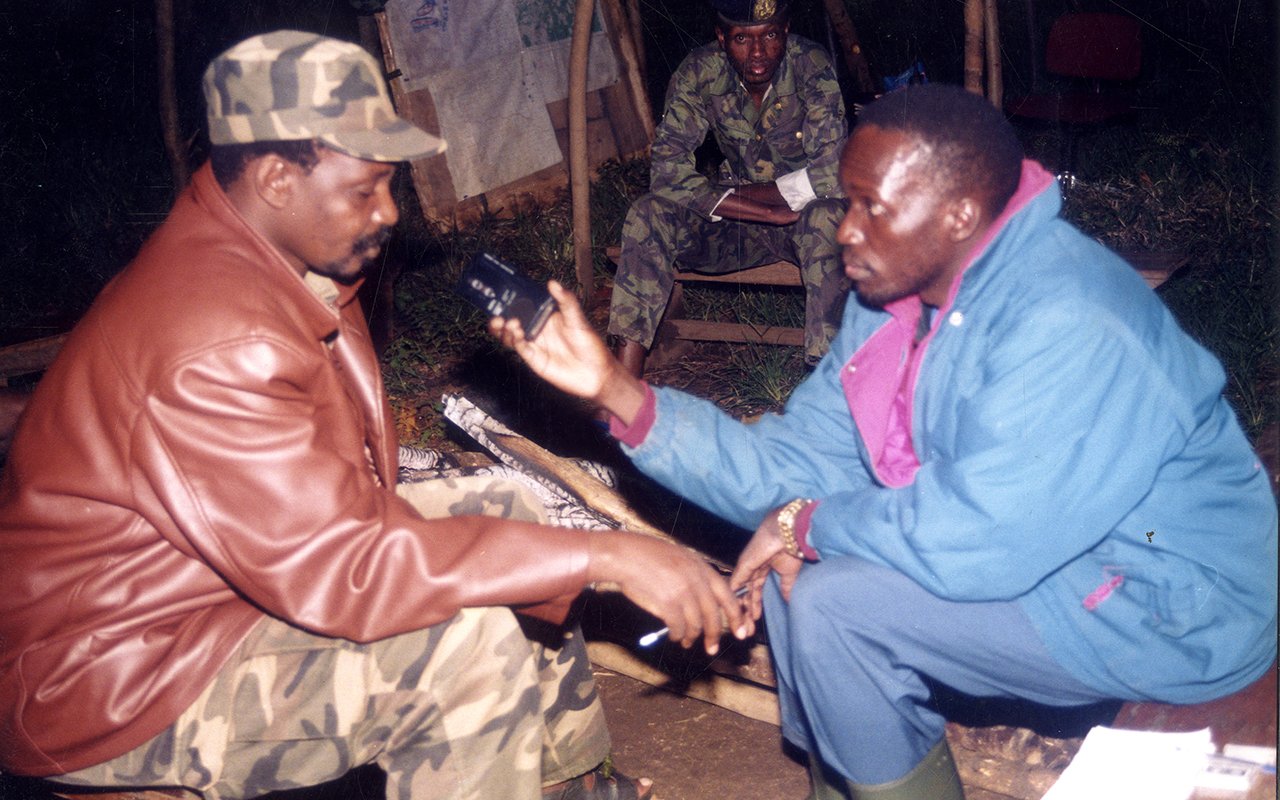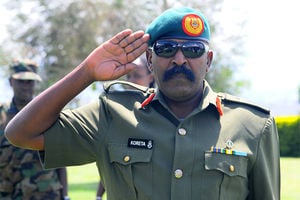
Former Monitor Chief Sub-Editor Ogen Kevin Aliro (right) interviews Maj Gen James Kazini in May 2002. PHOTOS/ FILE
On May 19, 2002, Maj Gen James Kazini, the newly named army commander of the Uganda Peoples’ Defence Forces (UPDF), gave a rare interview to The Monitor newspaper in which he promised that the leader of the Lord’s Resistance Army (LRA), Joseph Kony, and his rebel outfit would be finished within 45 days.
“Kony is now encircled by four of our brigades. This is definitely the last phase. I don’t see us going into Phase 4 or Phase 5 in this operation... The results shall be achieved in the next 45 days that have been granted again by the Sudanese... Kony will either be killed, die of hunger or surrender in the next 45 days,” said Kazini.
He added, “Very serious, and I still stand by that statement. If we don’t finish Kony in that time, we would be wasting much time.”
The interview with Ogen Kevin Aliro, one of the founders and editors of what we now know as Daily Monitor, was conducted within what was then a heavily fortified Gulu Barracks.
At the time Kazini, who had just been elevated from the office of Chief of Staff of the UPDF, had taken direct charge of the UPDF’s operations against the LRA’s bases in South Sudan.
The UPDF, working with permission from the government of Sudan, had entered deep into Sudan, attacked and destroyed LRA’s second largest camp at Bin Rwot, which was about 110kms from the common border with the Sudan.
Kony’s fighters were forced to flee, leaving lots arms and ammunition that had been donated to them by the government of Sudan.
“It is the last phase of the operation... The Imatong Mountains (in southern Sudan) are the last hideouts of Kony. His ammunition and food supplies are running out, as you saw in his camps we destroyed (Lubanga Tek and Bin Rwot). He abandoned most of the things the Sudanese had given him, and this has affected the morale of his fighters who are on the verge of collapse because of hunger and lack of ammunition,” Kazini boasted.
Abductions
By the time the UPDF launched its operations in southern Sudan, the LRA had abducted thousands of children, most of whom had either been forced to join their fighting force or taken on as ‘wives’ to some of the commanders of the rebel army.
A report, “Development and the next generation” revealed that the LRA had mostly concentrated on the abduction of males between the ages of 13 and 18. These would either be brutalised or forced to kill or murder either a friend or family member as a way of initiating and keeping them bound to the rebel outfit.
The report warned that there would be grave consequences in the Acholi sub-region, and indeed the rest of Uganda, if the abductions were not brought to an end.
“Those who had been abducted are more than three times as likely to have a serious physical injury or illness that impedes their ability to work. Abductees are twice as likely to report difficulties in family relations. They have nearly a year less education and they are twice as likely to be illiterate,” the report said.
It had, therefore, been hoped that the UPDF’s incursion into Sudan would also lead to the rescue of children and women who had been abducted, but that was never to be.
Misconception
Kazini explained that those hopes had been misplaced as they were not alive to the realities of the situation in the LRA.
“Once Kony captures these people, he doesn’t use them for anything else other than coercing them to become his fighters. And because of their background and the age factor, they tend to believe that Kony’s word is godly. So people must distinguish between the two; Kony fighters and the captives. Kony’s other fighters are already criminals who committed crimes in Uganda and even here in Sudan. So they are afraid the law will take its course,” he said.
No end to Kony
The 45-day period within which Kony and the LRA was expected to be destroyed ended on July 2, 2002.
The LRA and its commander were still very active. Kazini did not resign though. He was removed from office in June 2003.
Kazini died on the morning of November 10, 2009, in a rented semidetached house, at the home of his mistress Lydia Atim Draru in Namuwongo, close to the headquarters of Monitor Publications Limited.
The LRA and Kony on the other hand continued to cause death and suffering in northern Uganda until about 2006 when, under military and international pressure, it was forced to relocate to Garamba National Park in the Democratic Republic of Congo.
Forced to negotiate
The LRA was also forced to enter into negotiations with the government after Kony and two of his deputies, Otti Lagony and Okot Odhimbo, were indicted by the International Criminal Court (ICC) for crimes against humanity and war crimes.
In February 2008, the rebel force and government forces signed a ceasefire agreement.
Dr Ruhakana Rugunda signed on behalf of the Government of Uganda while the LRA chief negotiator, David Matsanga-Nyekorach, signed on behalf of the rebels.
The ceremony was presided over by the chief mediator and vice president of South Sudan, Mr Riek Machar, and witnessed by Mr Joaquim Chissano, the former president of Mozambique.
The charges
It should, however, be noted that the decision by the ICC to indict the LRA leaders was a major threat to peace. The rebels attempted to arm-twist government and ICC into having the charges against them withdrawn before they could sign on the dotted line.
The government’s response was that it could only do something about the indictment if the rebels went through with the peace process.
Joseph Kony was indicted on a total of 33 counts, 12 of crimes against humanity and 21 counts of war crimes.
The crimes against humanity included murder, enslavement, sexual enslavement, rape, inhumane acts of inflicting serious bodily injury and suffering. The 21 counts of war crimes including murder, cruel treatment of civilians, intentionally directing an attack against a civilian population, pillaging, inducing rape, and forced enlisting of children.
The 32 counts – 11 of crimes against humanity and 21 of war crimes – brought up against Vincent Otti included murder, sexual enslavement, inhumane acts of inflicting serious bodily injury and suffering, inducing rape, intentionally directing an attack against a civilian population, forced enlisting of children, cruel treatment of civilians, and pillaging.
Other commanders who were indicted on similar charges, but on fewer counts, include Okot Odhiambo, Dominic Ongwen and Raska Lukwiya and Otti Lagony.
On October 13, 2005, the court issued warrants for their arrest. It was the first time since the creation of the court by the Rome Statute on July 17, 1998, that the ICC was issuing warrants of arrest.
The development did not go down well with the rebels.
Okot Odhiambo died in the Central African Republic while Vincent Otti is believed to have met his death at the hands of his erstwhile boss.
Kony in the meantime remains alive, but in hiding in the Central African Republic where he is believed to be operating a camp.

Joseph Kony
About LRA boss:
Joseph Kony was indicted on a total of 33 counts, 12 of crimes against humanity and 21 counts of war crimes.
The crimes against humanity included murder, enslavement, sexual enslavement, rape, inhumane acts of inflicting serious bodily injury and suffering. The 21 counts of war crimes including murder, cruel treatment of civilians, among others.

